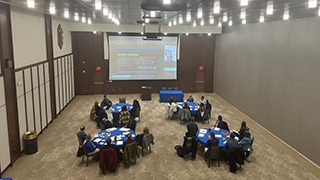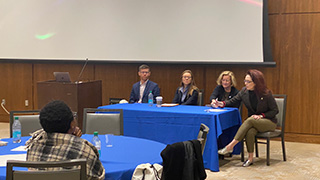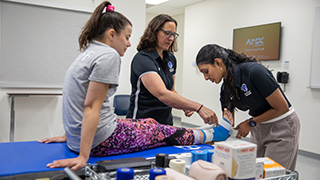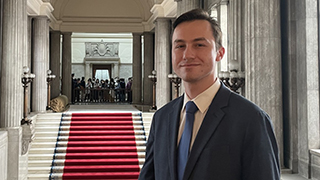Teachers Explore Science and Faith with the Center for Catholic Studies
Monday, November 25, 2024

New Jersey educators engage in a Science and Faith Professional Development Day.
On Friday, November 15, 2024, the Center for Catholic Studies at Seton Hall University hosted its annual Science and Faith Professional Development Day. Over 20 K-12 Catholic school educators joined Seton Hall faculty and staff for a day of collaboration and learning. This year’s event, titled Science and Faith: Exploring the Relationship, was conducted in partnership with the McGrath Institute for Church Life at the University of Notre Dame.
Bridging Faith and Education
The day began with a keynote from Chris Baglow, Ph.D., a professor in Notre Dame’s Department of Theology and director of the Science and Faith Initiative at the McGrath Institute. In his presentation, From the Cosmos to the Curriculum, Baglow explored the Church’s vision for Catholic education as a synthesis of faith and culture. He framed the conversation around guiding questions: Who am I? What does it mean to be human? What is the meaning of reality? Why is this object of study good, beautiful and true?
Baglow highlighted the complementary nature of science and faith, noting, “Science takes things apart to see how they work; the Bible brings things together to see what they mean.” He encouraged educators to integrate faith-based principles into their academic explorations, illustrating how the search for truth can unite all disciplines under the light of the Gospel.
Exploring Ethics, Cells and Good Science
The next presentation, Science Cannot Wait: What One Cell Can Teach Us About Racism, Theology, and Biotechnology, was delivered by Heather Foucault-Camm, BSc (Hons), PGCE, MSc, MA, program director of the Science and Religion Initiative at the McGrath Institute. In her talk, Foucault-Camm drew on the story of Henrietta Lacks to explore bioethics. Lacks, an African American woman who died in 1951 of cervical cancer, unknowingly became the source of a groundbreaking immortal cell line.
Foucault-Camm posed a critical question to attendees: “What does good science look like?” She emphasized that true scientific progress must align with moral law and serve the human good, as outlined in papal documents like Dignitas Personae and Gaudium et spes. Drawing from her experience as an educator, she reflected on the moral curiosity of high school students, particularly regarding complex topics like gene editing, cloning and biotechnology. Foucault-Camm emphasized the importance of centering bioethical conversations on love, respect and human dignity.
Mental Health and Catholic Theology
After small group discussions, participants attended a talk titled Faith and Mental Health by Beth Hlbase, M.S., LMHCA. Hlbase, the program director for the Fiat Program on Faith and Mental Health at the McGrath Institute, addressed the rising mental health challenges faced by young people. She identified three common themes among adolescents today: the longing to belong, a collapse of identity and the loss of childhood.
Hlbase dispelled misconceptions about mental health, stating that mental health is not defined by the absence of mental illness but rather by resilience in the face of suffering. Reflecting on Catholic theology, she noted that suffering is an inherent part of the human experience but also a path toward redemption. “Mental illness reflects our universal vulnerability to suffering,” she remarked, encouraging educators to approach these challenges with compassion and understanding.
Collaborative Conversations and Practical Applications
Throughout the day, small group discussions fostered collaboration and reflection among educators. Moderators included local Catholic School teacher and Seton Hall’s own Mary Landriau, MSW, who guided conversations about navigating difficult questions in the classroom. Participants emphasized the importance of fostering an environment where students feel valued and respected. As one educator noted, “Students will not remember all that we teach them, but they will always remember how we made them feel.”

Patrick Manning, Beth Hlbase, Mary Landriau and Heather Foucault-Camm field questions during a panel discussion.
The day concluded with a panel discussion featuring Baglow, Foucault-Camm, Hlbase and Patrick Manning, Ph.D., director of the Center for Catholic Studies. Together, they addressed questions from attendees and shared insights into integrating science, faith and mental health into Catholic education.
A Shared Mission
The Science and Faith Professional Development Day underscored the profound relationship between faith, science and education. Through thought-provoking presentations, collaborative discussions and practical tools, educators were equipped to address the intersection of science, theology and mental health in their classrooms.
From Baglow’s description of Catholic education as a synthesis of faith and culture to Foucault-Camm’s exploration of bioethics and Hlbase’s integration of mental health and theology, the event inspired educators to navigate complex topics with empathy and purpose. By fostering an environment of dignity and respect, this professional development day highlighted the mission of Catholic education: to form students who seek truth, serve others and reflect the Gospel in their lives.
The Center for Catholic Studies has a long tradition of faculty formation. The Center seeks to deepen partnerships with local Catholic dioceses and schools to help aid in professional development for Catholic educators. The Center helps build upon this tradition by being a resource for teachers and administrators at local Catholic schools by making the intellectual riches of the university available to the local Church.
Categories: Faith and Service






